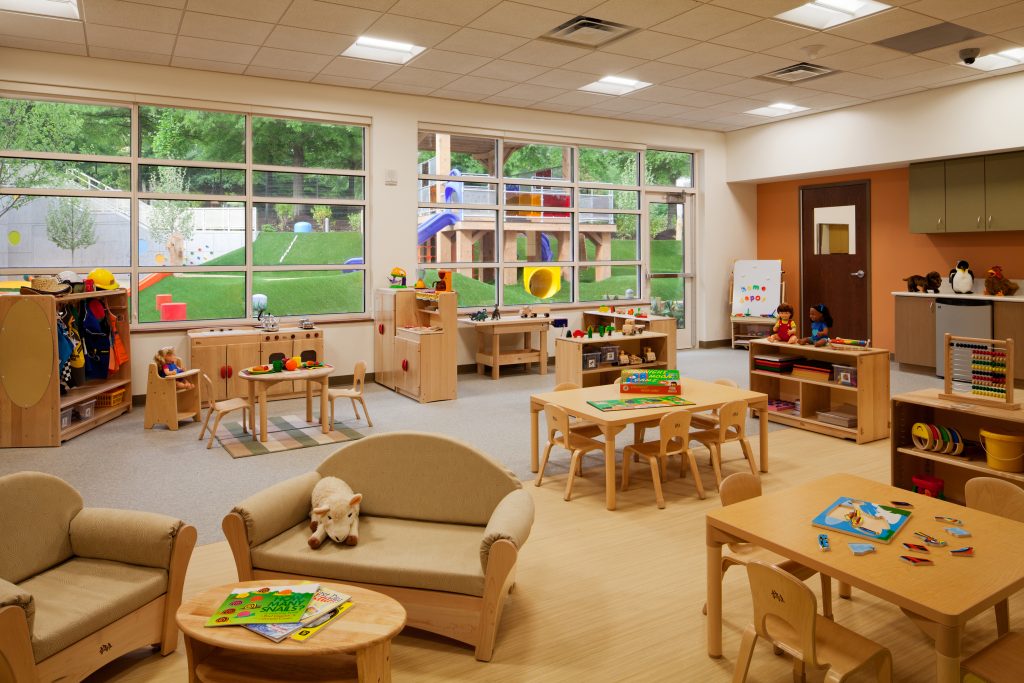Companies Realize Benefits Of Pitching In For Child Care

Little Apron Academy is an on-site child care center for employees of The Home Depot. The 60,000-square-foot facility is located at the company’s headquarters in Atlanta.
The Home Depot
One of the biggest challenges working parents face is finding quality, affordable child care.
The U.S. Department of Health and Human Services says child care shouldn’t cost more than 10 percent of a family’s income. However, the average cost in Fulton County in 2016 was $10,283.89 for one child. So, a family making less than $100,000 could have a hard time affording care.
Historically, the responsibility and cost of child care have fallen entirely on parents. However, it’s becoming more common for employers to chip in.
‘This Is Actual School’
On a Tuesday at Little Apron Academy, toddlers bang instruments during a music class and babble some of the words to a song called, “Wheels on the Bus.” Infants enjoy naps. Children of various ages are playing outside. Little Apron is a child care center for employees of The Home Depot. It generally serves children ages 6 weeks to 5 years old. It has camps that include older kids during public school holidays.
The center opened in 2012. It was two years in the making. The Home Depot partnered with a company called Bright Horizons, which helps businesses develop employee services, including child care.
Kimiko Johnson is a Bright Horizons employee and Little Apron’s executive director. She says even though the center serves young children, each classroom has a research-based curriculum.
“We have three gardens,” she says during a tour. “On the infant playground, we have sensory garden. So, we plant different things for sensory, whether it’s bright flowers or herbs. So they have different scents and smells. We do different textures as well.”
The outdoor area also includes a basketball court (adjusted for height) and a splash pad.
Parents say they can tell their kids are learning at Little Apron. It’s not a babysitting service, they say.
“This is actual school,” says Shilpa Arya, a senior manager at The Home Depot. She has two children at the academy. “My 3-year-old, last year, when she was in the toddler program, came home one day and started saying, ‘Please’ and ‘Thank you’ all on her own.”
While it’s not free, employees pay a lot less for care at Little Apron than they would pay at a center of equal quality somewhere else. The center is accredited by the National Association for the Education of Young Children (NAEYC), which has high standards. It is also part of the state’s ”Quality Rated” child care system.

Having on-site day care at work is a big benefit for employees like Arya, who can drop in and check on her kids whenever she wants. However, it’s not just beneficial for workers. It’s also advantageous for businesses because it can help them recruit and retain good employees.
“One of the reasons I took this job, we moved to Atlanta, really was having this on-site day care,” says Allison Spicer, who works on The Home Depot’s event planning team. Spicer and her husband moved from New York a few years ago, when they were thinking about planning a family. Now, their 19-month-old attends Little Apron. She’s “young” for her toddler class, but Spicer says her development has improved a lot since she started school.
“There is such a thing as positive peer pressure,” Spicer says. “She’s much more verbal. She’s much more coordinated. She watches her peers. She learns health hygiene.”
There are some drawbacks to a program like this. For one, there’s a long wait list. Johnson says on average, parents wait 1.5 to 2 years to get their children in. Both Spicer and Arya waited for months.
“With our 3-year-old, even though I got on the list as soon as I knew I was pregnant, we still did not make the first wave of entries,” Arya says, “So my 3-year-old went to a different day care for the first six months.”
Spicer used an at-home nanny for a year, while her daughter was on the wait list.
Location is also a challenge for some employees. Little Apron is near The Home Depot’s headquarters in Atlanta. Although it’s open to all employees in the region, it’s not convenient for every worker.
Companies Also Reap Benefits
Despite those downsides, companies have realized helping employees with child care is a win-win.
Research shows when workers have access to quality care, they miss fewer days of work, productivity increases and turnover decreases. Companies like Turner Broadcasting, Children’s Healthcare of Atlanta and law firms Alston & Bird and King & Spalding all offer on-site child care centers. The new Mercedes-Benz headquarters in Sandy Springs will also have on-site care. Experts say companies that offer those preschool settings are also helping prepare future workers.
“You’ve got this most immediate ‘workforce of today’ issue, but it is a ‘workforce of tomorrow issue’ as well,” says Celia Hartman Sims, vice president of government relations for KinderCare and president of the Early Care in Education Consortium.
Sims says investing in early education has long-term advantages.
“There’s a lot of attention around pre-K,” she says. “Pre-K is wonderful, but actually 70 percent of brain development is done in the first three years. So, ensuring that we actually have children in quality, early ed settings from birth to 3 is just as important for your workforce of tomorrow.”
Sims says employers are more willing to pitch in for the cost of care these days because they’re familiar with research touting its benefits.
Every center can’t be a “Little Apron Academy,” but she says employers don’t have to go broke trying to afford top-of-the-line care. Advocates say offering smaller benefits like backup child care, a small subsidy or sponsoring a few spots at a nearby child care center can all make a difference.








